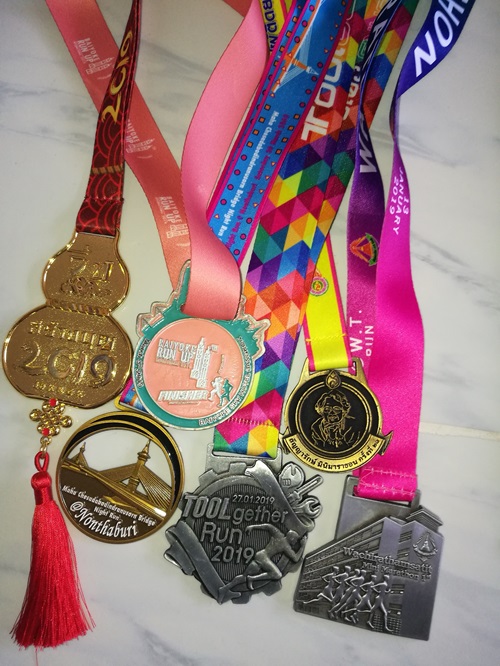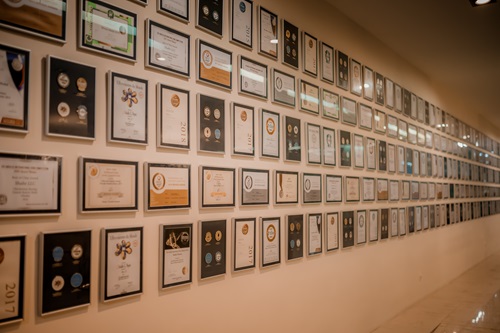
As sports tourism grows, more medals, more trophies, more plaques, more ribbons and more awards are being manufactured and handed out than ever before, meaning parents are faced with an ever-expanding amount of hardware that gathers dust as kids move to new levels of competition.
And when you come to think of it, it’s a classic catch-22: Getting rid of that swag makes parents (and athletes too, for that matter) feel guilty but keeping it around creates clutter. Throwing it out means awards go into landfills, already crowded with sports events’ non-recyclable (and in some case, recyclable) materials, creating more guilt as well.
These days, though, event owners can help – and raise themselves in the estimation of parents at the same time – by partnering with award-specific recycling programs. Some programs are state-specific and some are national, but all have the same goal: to get rid of the clutter and send it on its way to a better place, both easing the glut and increasing the feel-good factor.
So that means the slogan becomes: Reduce, Reuse, Recycle, Reward.
Wisconsin Life wrote about Madison-based Nationwide Trophy Recycling, noting that Janet Gray, the company’s co-founder, said that passing awards along gives recipients a sense of helping others.
 “What people are doing is a sense of feeling of honor. These awards have honor and feelings with them,” said Gray. “They just can’t take it to the garbage. Now sure, they could take them to Goodwill. Goodwill is going to sell them in their stores and take their plates off. (People) want to feel better about this. This is another step going forward saying you’re not going to just throw it away; you’re going to give them away to someone else to feel that honor. You’re going to pay it forward. So, it’s up to those who really want to see their trophies have another life.”
“What people are doing is a sense of feeling of honor. These awards have honor and feelings with them,” said Gray. “They just can’t take it to the garbage. Now sure, they could take them to Goodwill. Goodwill is going to sell them in their stores and take their plates off. (People) want to feel better about this. This is another step going forward saying you’re not going to just throw it away; you’re going to give them away to someone else to feel that honor. You’re going to pay it forward. So, it’s up to those who really want to see their trophies have another life.”
Nationwide Trophy Recycling takes plaques off trophies and sends them along the line to nonprofit organizations whose owners might not be able to afford trophies for their participants. A plaque is far less expensive than a whole trophy, and the nonprofit can choose to have something engraved, or not – if the award can stand on its own.
The question of what to do with trophies came to the fore when none other than Chris Pratt (y’know, Star Lord from Guardians of the Galaxy) posted a photo on Instagram of his wife holding a trophy from 2000, and after noting how proud he was of her accomplishments, asked, “But real talk… once your kid goes through the stuff, is it okay to toss? I mean… do we need the I was on a sports team trophy? Can they be donated? Repurposed? How many do we gotta keep? Not all of them, right? Any of them? Is there a grading scale? Like, did you win? Were you a champion? Is there a specific sentimental connection? Help me out here. Do they go back in storage?”
Yes, Star Lord, they can be donated and repurposed. And Groot (that’s a talking tree superhero in case you’re not a reader who is invested in the Marvel Comics Universe) would be proud. He might only say, “I am Groot” (Google it) but he would still be proud. Particularly of companies like Revived Glory Awards, where adults with disabilities have paying jobs helping to recycle old trophies by removing the name plates and other identifying hardware.
“We want to provide a very market-competitive product that competes with all the big companies out there, and we want people to support us because of what we offer and because of who we employ,” company founder Sharon Meaden said.
Workers earn the title of “trophy master” by learning new skills, including lasering and coining bases – as well as multiple other jobs.
Another feel-good project was thought up by Holmes Custom, who worked with an organization called Dreams Come True to give trophies to children completing chemo and radiation treatments.
"We told Holmes Custom what we wanted to do, and with no hesitation, they signed up for it," Andrea Siracusa, the Director of Community Relations with Dreams Come True Jacksonville, told reporters at First Coast News.
Tiffany Thompson, Customer Service Manager for Holmes Custom, said, "We all know that there are so many trophies sitting around – old, unused – what better to do than recycle and do this for a great cause?"
Sometimes, individual organizations, like this bowling league for individuals with challenges, that are operating on a shoestring, need trophies for their end-of-the-season ceremonies. (It’s surely not the only organization nationwide like this; event owners can likely find organizations in any sport nationwide who can use awards.)
In most cases, organizations outside the area of the company accepting the awards must pay shipping to the destination; there may be (or may not be) additional fees pertaining to the number of trophies to be recycled but if event owners want to participate, it is an excellent public relations strategy.
If event owners are planning ahead, they can put notices on their site, asking not just for donations of trophies, but giving a secure payment form to make a donation to help cover the cost. Or not – it’s entirely up to the event owner.
Any number of trophy companies participate in trophy recycling. One is Awards Mall. Another is Lamb Awards & Engraving. Yet another is Total Awards and Promotions. And there are likely plenty of others.
And, as TreeHugger notes, trophies are not the only awards taking up valuable real estate in a home. Race medals (any medal, in fact) can be donated to Medals4Mettle. Through a nationwide network of physicians and volunteers, this organization bestows medals from marathons, half-marathons and triathlons to children and adults fighting debilitating illnesses “who might not be able to run a race but are in a race of their own just to continue to live their life.” (Bling for Bravery, a Texas-based program, also donates wearable awards to children fighting cancer.)
 By the way, in 2020, all Olympic medals handed out in Tokyo were made of recycled materials.
By the way, in 2020, all Olympic medals handed out in Tokyo were made of recycled materials.
Even ribbons, the kind kids get for winning (or sometimes participating) in sports events can be recycled, according to Heels Down Magazine, which noted, “Sue M. Copeland founded her own group after she noticed too many ribbons being tossed in the dirt at horse shows.” It even happened, she noted, “at premier horse shows, like the APHA World Championships and WEF. I wasn’t born a zillionaire and had to work hard to get to these shows. So, I thought this was a situation where one man’s trash became another’s treasure.”
Copeland began collecting ribbons and donating them to organizations around town. She then wrote a column in Horse & Rider Magazine about her efforts. “The response I received was overwhelming,” she said. When asked to ballpark how many ribbons she’d donated since she started, she guesstimated “tens of thousands.”
Copeland is not accepting ribbons right now (she has plenty) but nationwide, there are grassroots programs for therapeutic riding, veterans groups, sports for children with special needs and plenty of others where ribbons can be donated; event owners can check their local listings to locate one. (Heels Down notes, “The Professional Association of Therapeutic Horsemanship International (PATH) has been a tremendous resource for putting ribbon donors in touch with programs who need them in their own metro areas.”)
There are plenty of other creative ideas for what to do with leftover awards. Running Awards and Apparel notes, “One of our favorite uses for leftover medals is hosting an event that features a medley of surplus race swag for participants. One such event is the Leftover Run in Dublin, Ohio that was held in November of 2019. This concept includes letting runners take their pick of leftover race shirts upon arrival and then letting them choose from a mix of race medals upon finishing. The proceeds from this fun event all go to the local Goodwill.” (Don’t have one of these in your neck of the woods? Talk with a running director about starting one.)
And as Janet Gray of Nationwide Trophy Recycling notes, awards just make competition mean more to both kids and adults by creating a sense of accomplishment.
“I think it’s about the honor and feeling of being appreciated, or of accomplishing something,” said Gray. “People need to be recognized. You’re going to stand up real straight when you’ve been appreciated. You’ve done all this work, and they love you for it. That’s what people feel when they get awarded with something, I think, the appreciation, you can feel it.”
 What happens next to those trophies, awards, ribbons and plaques is up to event owners.
What happens next to those trophies, awards, ribbons and plaques is up to event owners.
Essential points for event owners to note when partnering with awards recycling programs:
- Vet organizations carefully to ascertain they are legitimate
- Research beforehand by doing Google searches on trophy (or medal or plaque) recycling in the host city, or look for nationwide programs. A local program means event owners can do their own drop-off and save on shipping fees (see the next bullet point).
- Research what fees apply (some companies may just require event owners to pay shipping for awards while others may charge certain amounts according to the number or weight of awards contributed).
- Find out exactly what types of materials organizations can accept. Some deal only with trophies, some with medals, some with ribbons and some with plaques; if need be, set up different donation receptacles so that donations are sorted correctly.
- Remember that parents and participants may be so enthusiastic about donating items that they may not sort awards, but may bring cartons containing all awards (medals, trophies and plaques) and dump them all at once – so event owners or volunteers will likely need to spend some time parsing donations prior to sending them off.
- In fact, remember that the amount to be donated may exceed a receptacle’s capacity; it may be better to have a tent where volunteers accept and sort awards, and thank people for donating.
- Do a press release to local media, promoting both the event and its ability to recycle awards. A receptacle overflowing with awards is an excellent visual that will likely get picked up for coverage. A photo of an event owner pulling into an awards company with a load of recyclable awards (great publicity for both the event owner and the award company partnering with a recycling program) might also be a great idea.

